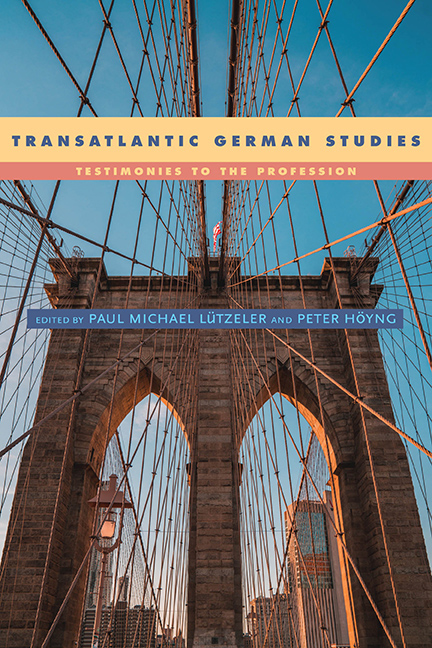Book contents
- Frontmatter
- Dedication
- Contents
- Acknowledgments
- Introduction
- From Erfahrungshunger to Realitätshunger: Futurity, Migration, and Difference
- In-between: The Participant as Observer—The Observer as Participant
- Transatlantic Space and My Own History of Globalization
- Deplazierte Personen: Why Would an American Become a Germanist?
- Metamorphoses and Meanderings of a Wanderer between Worlds
- German Studies as Vocation: My Path into It, Out of It, and Back into It
- My Long Way from Germanistik to Afro German Studies
- Mustang Red: My American Road to Critical Theory
- Third Place: How a French Germanist Became an Applied Linguist in America
- Transatlantic Exchanges: German Studies—European and American Style
- Being at Home in the Other: Thoughts and Tales from a Typically Atypical Germanist
- After Australia: Triangulating an Intellectual Journey
- A Tale in Translation: An Academic Itinerary from Istanbul to Bryn Mawr
- Beyond Passing: Transculturation in “Contact Zones”
- Far from Where? Germanistik between the Continents
- Epilogue: The Usefulness of Useless Studies
- Index
German Studies as Vocation: My Path into It, Out of It, and Back into It
Published online by Cambridge University Press: 14 February 2019
- Frontmatter
- Dedication
- Contents
- Acknowledgments
- Introduction
- From Erfahrungshunger to Realitätshunger: Futurity, Migration, and Difference
- In-between: The Participant as Observer—The Observer as Participant
- Transatlantic Space and My Own History of Globalization
- Deplazierte Personen: Why Would an American Become a Germanist?
- Metamorphoses and Meanderings of a Wanderer between Worlds
- German Studies as Vocation: My Path into It, Out of It, and Back into It
- My Long Way from Germanistik to Afro German Studies
- Mustang Red: My American Road to Critical Theory
- Third Place: How a French Germanist Became an Applied Linguist in America
- Transatlantic Exchanges: German Studies—European and American Style
- Being at Home in the Other: Thoughts and Tales from a Typically Atypical Germanist
- After Australia: Triangulating an Intellectual Journey
- A Tale in Translation: An Academic Itinerary from Istanbul to Bryn Mawr
- Beyond Passing: Transculturation in “Contact Zones”
- Far from Where? Germanistik between the Continents
- Epilogue: The Usefulness of Useless Studies
- Index
Summary
MY TITLE ALLUDES TO an essay by Max Weber, published in 1919, titled “Wissenschaft als Beruf.” That essay was the expanded written version of a talk delivered almost exactly a hundred years ago, on November 7, 1917, to students in Munich in a series “Geistige Arbeit als Beruf.” Weber's essay seemed appropriate to me as an inspiration not only because of its centennial, but also, and more importantly, because it takes up issues of selecting the path of academic life as a career choice, and thus relates to my past, and quite likely to the past decisions of many of my colleagues. The latter part of Weber's essay, perhaps the most interesting from a theoretical standpoint, deals with the nature of knowledge and how it has changed over the centuries, and delves into Weber's theory concerning the disenchantment of the world with the advent of modernity. But the more relevant sections of the talk and the essay for our context are those that occur in the first half, relating to external and internal factors that confront young men and women in considering the professoriate. To his credit, Weber explores both connotations of the word “Beruf.” His audience was probably expecting him to focus on its meaning as a calling and to hear his views on the internal motivation necessary for pursuing a scholarly career. But Weber disappoints in his initial remarks by looking first at Beruf as an occupation that entails the mundane considerations of monetary compensation, workload, and career advancement (3–9).
Before I even came to consider these practical matters of the profession, I encountered as a graduating senior from the University of Pennsylvania several complicating factors to pursuing German studies as a vocation. The first was that I knew no German. In high school I had studied Spanish, and as an undergraduate I had completed the three-year language requirement by struggling through the fifth and sixth semesters of that language. The second difficulty was that I had very little familiarity with German literature or culture. My major was Natural Sciences, a composite course of instruction that demanded three semesters of mathematics and physics, and two years of chemistry (inorganic and organic), biology, and a focus on one scientific discipline with a series of courses beyond the minimum requirement.
- Type
- Chapter
- Information
- Transatlantic German StudiesTestimonies to the Profession, pp. 86 - 105Publisher: Boydell & BrewerPrint publication year: 2018



